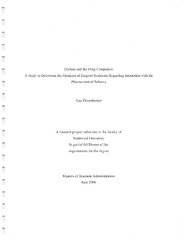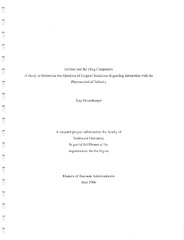| dc.contributor.author | Ditzenberger, Kay | en |
| dc.date.accessioned | 2018-04-05T15:45:15Z | |
| dc.date.available | 2018-04-05T15:45:15Z | |
| dc.date.issued | 2006-06 | en |
| dc.identifier.uri | archives.northwestu.edu/handle/nu/30884 | |
| dc.description.abstract | While the potential for conflict of interest exists in all occupations and professional interactions, none have held the current concern or interest of the popular press and society as much as the potential conflicts that exist between physicians and the pharmaceutical industry. Of particular interest in the debate have been the conflicts that exist between physicians and researchers in academic medical centers and the pharmaceutical companies that promote their products and reap the benefits of new molecules and technologies that emerge from these institutions. To determine the current attitudes and beliefs held by physicians toward representatives of the pharmaceutical industry a survey was conducted at a major academic medical institution. Surgery residents at the institution were asked a series of 19 questions to determine their opinions regarding the quality of their interactions with sales representatives, departmental policy, regulation and research. A total of 34 residents responded to the survey. Results were calculated on the class as a whole and a sub-analysis was conducted to determine if responses varied between first and second, third, or fourth year residents. Overall surgical residents favored policies that allow pharmaceutical representatives to continue to detail and promote their products within the institution. A large majority of physicians felt the literature and educational resources presented in the institution were both accurate and valuable. The majority of physicians felt the current institutional policies regarding interactions with representatives of industry were adequate. Attitudes among surgery physicians changed slightly during their four year residency. A majority (90%) of all fourth year residents agreed that pharmaceutical representatives should be allowed to detail or interact with physicians at the institution versus 78% of first and second year residents and 83% of third year residents. Though the potential for conflict of interest obviously occurs in academic medicine, as it does is a vast number of other occupations, the results of this survey suggest that physicians believe the relationship between academic physicians and the pharmaceutical industry should continue. The survey confirms public opinion; the relationship should continue but terms of the relationship may need to be rewritten to better reflect the complexities introduced by society. New societal pressures that force a redefinition of the relationship include the advent of technology transfer via the Bayh-Dole Act, increased financial pressures on physicians and institutions from Medicare reform and the public's cry for greater transparency on the part of pharmaceutical companies. The emerging relationship between big pharma and academia must evolve into one of mutual trust, respect and shared scientific and fiscal goals. | en |
| dc.format.extent | ii, 71 pages, v | en |
| dc.format.medium | Paper | en |
| dc.language.iso | en | en |
| dc.publisher | Northwest University | en |
| dc.rights | This original work is protected by copyright. Copyright is retained by the author(s). Works may be viewed, downloaded, or printed, but not reproduced or distributed without author(s) permission. | |
| dc.rights.uri | http://archives.northwestu.edu/page/copyright | |
| dc.title | Doctors and the Drug Companies: A Study to Determine the Opinions of Surgical Residents Regarding Interaction with the Pharmaceutical Industry | en |
| dc.identifier.box | 87 | en |
| thesis.degree.name | Master of Business Administration | en |
| thesis.degree.level | Masters | en |
| thesis.degree.grantor | Northwest University | en |
| thesis.degree.discipline | School of Business | en |



 Maintained by the Northwest University Library
Maintained by the Northwest University Library